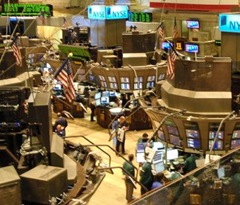Time for another episode in my continuing series People Are Idiots. Previous installments have included how to sell your students wine and how to get rich on the internet.
 Today we visit another phenomenon of cognitive misbehavior, what I like to call the Small Percentage Effect. (It has some other fancy name among behavioral economists. I like mine better.)
Today we visit another phenomenon of cognitive misbehavior, what I like to call the Small Percentage Effect. (It has some other fancy name among behavioral economists. I like mine better.)
Imagine that you have decided to buy the latest, totally cool and sexy, iPod. It retails for $200. You are about to pick it up at a shop near your home when you hear that all the way across town a store is running a one-day special promotion, selling this iPod for only $100. It is a 90 minute round-trip drive, but you gleefully head off to score your bargain iPod.
Unfortunately, after a while you realize that the iPod is not attracting nearly the number of members of the opposite sex that you expected. So you hatch Plan B, an even more totally cool and sexy convertible. The dealership near your house will let you drive it off the lot for $50,000. But then you find out that another dealership, coincidentally next to the place where you got the bargain on the iPod, will sell it to you for only $49,900.
Read more »
There is a very amusing site that bills itself as "entertainment shopping" called Swoopo. After a brief investigation, I have concluded that:
1. You would have to be a complete idiot to spend money on this site.
2. I am a complete idiot for not thinking of it first.
 How Swoopo works is deceptively simple. They auction off desirable items such as notebook computers and big flat screen TVs. But the auctions have some very special rules. It costs $0.75 to place a bid. Bids can only top previous bids by a certain small amount, usually $0.15 but in some cases only $0.01. There is no fixed end time for the auction. It continues until nobody has bid for 20 seconds.
How Swoopo works is deceptively simple. They auction off desirable items such as notebook computers and big flat screen TVs. But the auctions have some very special rules. It costs $0.75 to place a bid. Bids can only top previous bids by a certain small amount, usually $0.15 but in some cases only $0.01. There is no fixed end time for the auction. It continues until nobody has bid for 20 seconds.
Get it?
This is an amusingly profitable deal for Swoopo. Although they wind up selling the merchandise for much less than it is worth, the bidding fees collected swamp the small loss involved. For example, yesterday morning the bidding on a Sony Playstation 3 worth (Swoopo tells us) $399.99 sold for $126.60. That’s a nominal loss of $273.39 from retail. But to get to $126.60 in $0.15 increments took 844 bids, representing $633 in revenue to Swoopo. Brilliant.
Read more »
Most people, including experts and even sometimes this blogger, use what I call the Black Box Theory of Stock Market Returns. It isn’t really much of a theory. The idea is that the internal workings of the stock market are basically mysterious and unknowable by mortals. The best you can do is to observe what has happened historically to people who have put money into the box  and average their results.
and average their results.
So we find that the S&P 500 return has averaged X% over some number of decades and we conclude that over the long run that is what we will get from the stock market. You may not get X% in any given year, but you should expect to get that as an average over a long period, because that was the average over a long period in the past.
This is not an entirely unscientific approach. It is objective and makes appropriate use of data. But on reflection it should be pretty clear that it is not all that scientific either. It lacks any sort of explanation of how or why the market returned X%. Maybe there was something that was driving the market up in the past that will not apply in the future. It’s possible.
Read more »
I’ve got a guest post on Consumerism Commentary today, so if you want your daily dose of my brilliant thoughts, you need to go there. I did not pick the calming and pastoral photo.
Friday calls for lighter fare, so today I thought I would present evidence that this financial crisis we are now living through is not particularly unique. Realizing that some may find the idea that we are doomed to go through this  every few decades less than cheering, I will present it in the form of a quiz. As I’ve said before, everybody likes a quiz.
every few decades less than cheering, I will present it in the form of a quiz. As I’ve said before, everybody likes a quiz.
Question 1: The Buildup
In what year did BusinessWeek editorialize as follows about the stock market?
For five years at least American business has been in the grips of an apocalyptic, holy rolling exaltation over the unparalleled prosperity of the "new era" upon which we, or it, or somebody has entered.
Stock prices are generally out of line with safe earnings expectations, and the market is now almost wholly "psychological."
Read more »
 Today we visit another phenomenon of cognitive misbehavior, what I like to call the Small Percentage Effect. (It has some other fancy name among behavioral economists. I like mine better.)
Today we visit another phenomenon of cognitive misbehavior, what I like to call the Small Percentage Effect. (It has some other fancy name among behavioral economists. I like mine better.)

